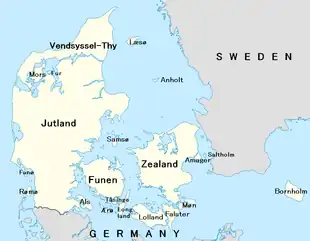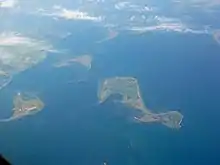
This is a list of islands of Denmark.
Overview
There are around 1400 islands in Denmark, where about 409 of the islands are named, not including the Faroe Islands or Greenland.[1] Some 70 of them are populated while the rest are uninhabited. Some of the uninhabited islands have only become uninhabited in recent decades, for economic reasons, as lighthouses and other publicly run facilities either became automated, or relocated to main islands or Jutland peninsula. Others became uninhabited as living costs outpaced income for the often fewer than 10 locals.
Definition
Different lists of Danish islands vary, depending on how the word "island" is defined. According to the official Danish Government definition, an "island" needs to be surrounded by water at least one-half metre deep, and also to have land vegetation.[2]
Another common criterion is that an "island" needs to be surrounded by free-flowing, natural water and not just an artificial, narrow canal. According to this criterion, places such as Christianshavn and Holmen in Copenhagen, although sometimes referred to as artificial islands, are actually parts of the island of Amager.
Dynamic number
The number of islands in Denmark changes from time to time. New islands are occasionally formed by sedimentation. Several examples of these new islands are found in the waters around Æbelø, north of Funen, including Drætlingen which formed in the late 1990s, and a still unnamed islet that was registered in 2008. These new islands are generally less stable than larger, morainic islands, and may later disappear again. Other islands are created artificially. Peberholm, formed in the process of construction of the Øresund Bridge, is a notable example. Other artificial Danish islands include a number of marine fortresses off Copenhagen, such as Middelgrundsfortet, Trekroner Fort and Flakfortet.
Islands may also disappear. An example of this is Jordsand, one of the Danish Wadden Sea Islands. According to records from 1231, the island then had an area of about 2,000 hectares (8 square miles). After a series of severe storms during that century, its area decreased to around 41 hectares, and by 1763 to around 18 hectares. By December 1999, the European windstorm Cyclone Anatol had destroyed the last piece of the island and Jordsand had ceased to exist.[3]
In other cases, islands are absorbed by larger neighbouring masses of dry land, as a result of either natural sedimentation or artificial land reclamation in the channels separating them. Sometimes this means that an island becomes a cape or headland, or a peninsula as is the case of the former island of Reersø.
Denmark's second largest island, the North Jutlandic Island, was not always an island. A storm on 3 February 1825 penetrated the narrow land mass, Agger Tange, and thus separated Northern Jutland from the rest of Jutland. The area had earlier been an island, when a strait at Vust had been open prior to the 12th century.
List of 100 largest Danish islands
This is a list of the 100 largest islands of Denmark (press the symbol after the headings in the table to rearrange the list according to population size, location or alphabetically):
Other populated islands
- Frederiksø - see Christiansø above
- Egholm
Areas sometimes referred to as islands
- Jordsand, a former island
- Christianshavn, considered part of Amager Island
- Holmen, considered part of Christianshavn/Amager
Other small unpopulated islands
- Lindholm, Stege Bugt (which has a medical research facility)[5]
See also
References
- ↑ "Facts and Figures Archived 2010-06-30 at the Wayback Machine", Danish Defence, Defence Command Denmark. Retrieved 11 June 2010.
- ↑ "Hov - den der ø har jeg ikke set før". Politiken. Retrieved 2010-07-30.
- ↑ . "Danmarksnationalparker.dk". Øer der kom og gik. Archived 2013-06-24 at archive.today Retrieved 20 June 2013
- ↑ "Danmarks Statistik." Retrieved 11 June 2010.
- ↑ "Lindholm Forsøgsstation" Archived 2011-07-19 at the Wayback Machine, Møn Kulturarvsatlas. (in Danish) 13 June 2010.
